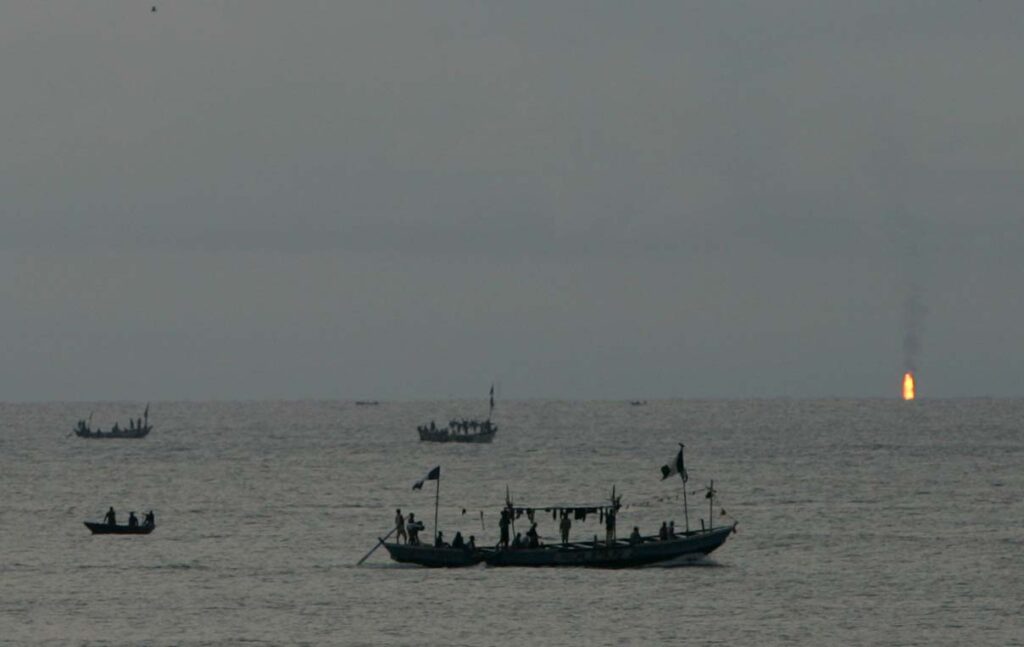Nigeria’s marine conservation efforts are lagging, even with a new blue economy ministry, as ecosystem threats grow.
Standing on the shores of Ibeno in Nigeria’s southern Akwa Ibom state, Ola Oyi gazes at the horizon, his anxious face reflecting years of battling the seas. The ocean has provided for his family for over two decades, but lately, the catch has been relatively meagre. “We used to pull in fish a lot before. Now, we go out and come back with a lot less,” he said.
The 51-year-old blames the declining fish catch on oil pollution, unchecked overfishing – particularly by illegal foreign vessels – and pirate attacks that force fishers to avoid certain areas.
Oyi is one of millions of fishermen living on Nigeria’s coast, hoping to see a turn of the tide in their catch and government intervention to protect the ocean and safeguard their livelihoods at a time of crushing economic crisis that has pushed some 19 million people into poverty in the last year, according to World Bank. So far, they’ve heard nothing. “There is no support whatsoever from the government,” he said.
When President Bola Tinubu’s administration created the Ministry of Marine and Blue Economy last year, hopes were high. Environmentalists saw the move as a way to better balance Nigeria’s conservation needs with economic development.
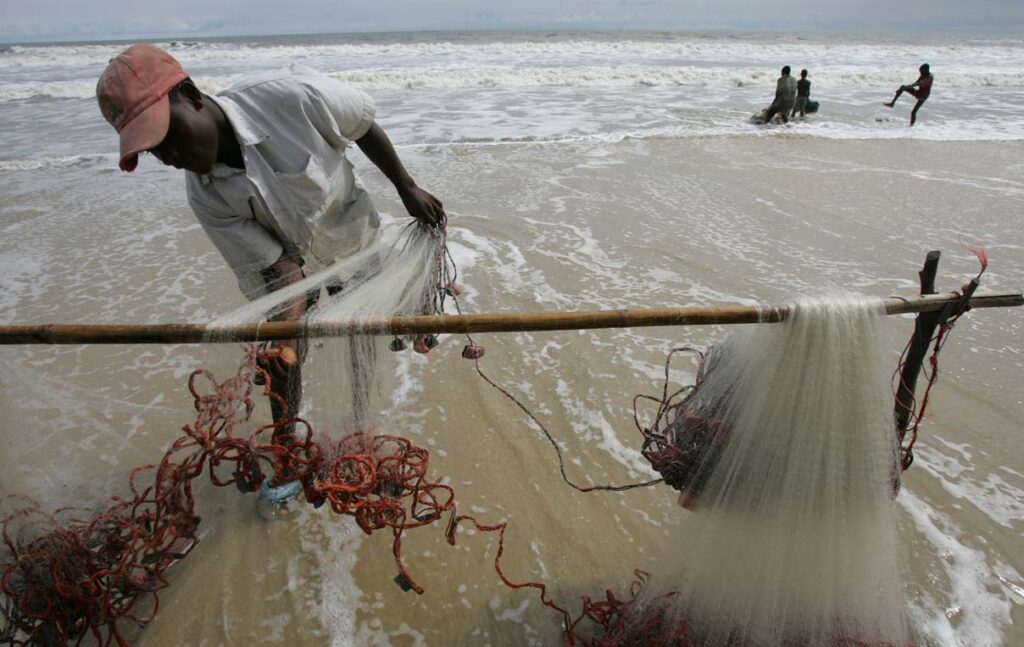
The new ministry was planned to align with the African Union’s Blue Economy Strategy and the United Nations’ Sustainable Development Goals (SDGs), particularly SDG 14, which encourages conserving the ocean and ensuring sustainable use of marine resources.
More than a year later, the ministry has made little to no progress in marine conservation, let alone implemented an inclusive approach for thousands of communities dependent on aquatic resources for their livelihoods. The ministry lacks a comprehensive strategy plan, a clear budget, and concrete initiatives for coastal conservation.
“The effect of the new (marine and blue economy) ministry has not been felt down the ladder to where the coastal dwellers are,” Professor Ikenna Onyema, a marine scientist at the University of Lagos, told Africa in Fact.
“The environmental management plans are not implemented. Hence, there are no fish in the rivers, and the creeks are polluted. The mangroves that are the nursery grounds for migratory fish are dying because they are suffocating. They have been impacted by (crude) oil.”
Marine conservation is key to Nigeria’s blue economy, which aims for sustainable ocean use and better coastal livelihoods. Nigeria’s 850 km coastline, which stretches from Lagos in the southwest to Calabar further south, boasts rich marine resources. The country has one of the world’s largest mangrove ecosystems, covering more than 10,000 square km. The mangroves act as carbon sinks, marine habitats, and protection against coastal erosion.
The UN says the sustainable management of these ecosystems could boost fisheries, ecotourism, and climate resilience, especially in countries like Nigeria, where millions depend on freshwater and ocean fish and other coastal resources for food and income. However, these ecologies have faced severe degradation from oil and plastic pollution, overfishing, mangrove destruction, and ocean acidification. Pollution caused by illegal oil refineries run by criminal gangs also plagues the region.
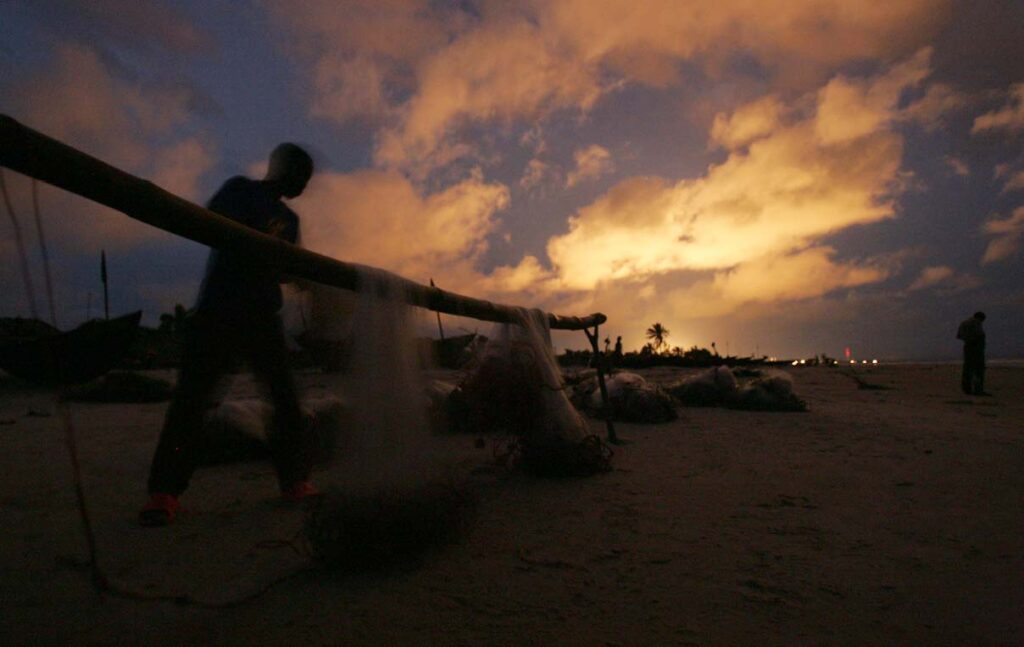
The loss of mangroves has driven coastal communities to the edge of environmental and economic crises. According to the United States Agency for International Development (USAID), Nigeria has lost 35% of its mangroves over the past 20 years. The International Union for Conservation of Nature (IUCN) also warned that unsustainable practices put Nigeria’s coastal biodiversity at severe risk. Yet, despite the mounting evidence, little attention is given to marine conservation efforts.
“Local communities around the riverine areas, around the lagoons and creeks and estuaries, are still using obsolete techniques for fishing; they are still harvesting coastal and riverine plants and animals in an unsustainable way,” said Onyema.
Experts say Nigeria can transform its coasts by adopting responsible fishing, creating marine protected areas, and restoring mangroves. Involving coastal communities in these efforts would ensure sustainable resource management, reduce poverty, and boost climate resilience.
The goal is to reduce pressure on natural resources by diversifying livelihoods and promoting marine conservation, according to Victor Ebong, professor of agricultural economics at the University of Uyo, in the coastal state of Akwa Ibom. “There has been overexploitation of ocean resources due to poor regulation by appropriate authorities,” he said.
With growing global interest, the blue economy is emerging as the new green economy, and more countries in Africa, including Nigeria, Seychelles, Kenya, Mauritius, and Madagascar, are setting up dedicated blue economy ministries or state secretariats, according to the Organisation for Economic Co-operation and Development.
Previously, Nigeria’s marine economy was managed by a committee set up in 2022 and headed by the country’s vice president, but it had no clear national framework. The Tinubu administration, which came into office in May 2023, created a dedicated ministry to accelerate progress.
On its website, the ministry lists its mandates, including marine conservation, and speaks of its determination to engage with coastal communities. In reality, government efforts have focused more on the economically lucrative aspects of the blue economy, such as shipping, port development, and offshore energy.
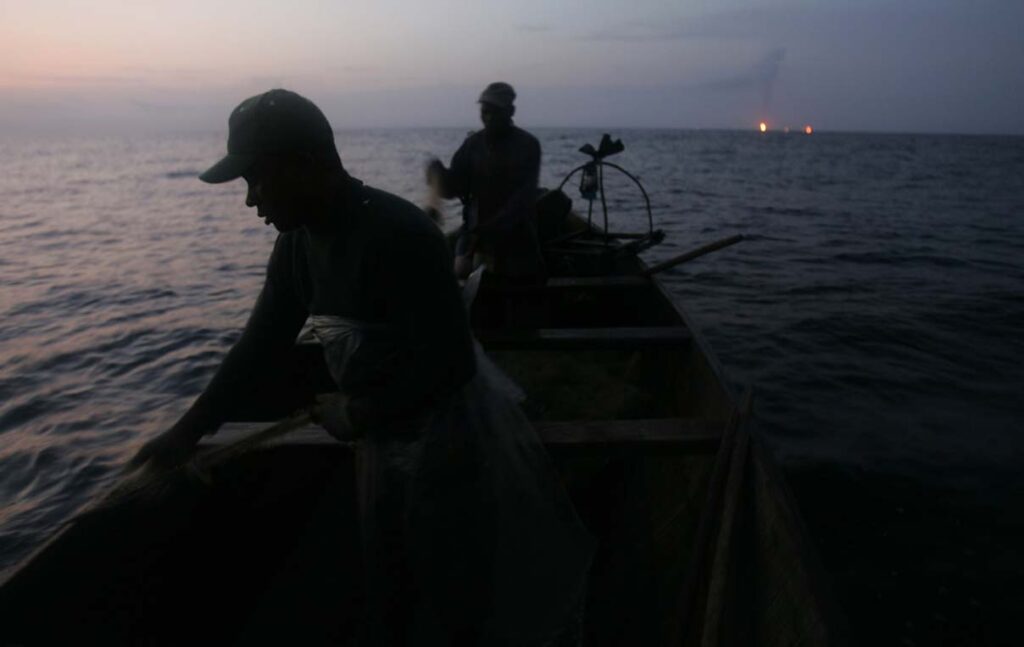
In the past year, there were no programmes towards marine conservation, officials said. The ministry has still not produced a national policy framework more than a year after its creation.
Environmental activists have expressed alarm over the lack of progress. “When it comes to the marine and blue economy, not much has been done, either in shore protection or the dividends that it is supposed to bring,” said Henry Erikowa, who leads Coastal and Marine Areas Development Initiative, a non-profit based in the oil-rich Niger Delta region.
The government, however, has said it would start with “sensitisation” of communities on marine conservation, and a programme is billed to begin in the coming months. “We thank the president for creating this ministry. We are making progress, and we believe the first step is to enlighten communities about conservation,” Omoragbon Wellington, who heads the fisheries and aquaculture unit at the Federal Ministry of Marine and Blue Economy, told Africa in Fact.
Government insiders have said progress is slow because the department is not yet fully organised. Since its launch, there has been no formal budget for marine conservation and no clear plan. More than a year later, office buildings are still being assigned, and duties are still being allocated.
In the 2024 federal budget, the closest allocation to marine conservation was 14.9 million naira ($8,976), designated for “preliminary assessment for conservation plans of wetlands”. There was no indication the fund was released.
A top official, speaking anonymously, told Africa in Fact, “We don’t even have a budget as we speak. It was just last month that we managed to move some of our staff from the old office.”
At an event to review a draft strategy in mid-October last year, Blue Economy Minister Adegboyega Oyetola said the ministry’s establishment “reflects our firm commitment to harnessing Nigeria’s vast marine resources.”
“Our goals include increasing blue food production, creating jobs, and building climate-resilient coastal communities,” he said. The minister confirmed the recent transfer of the fisheries and aquaculture department and said the move “further strengthens our focus on these areas”.
Oyetola said the strategy document was being developed with support from the African Union – Inter-African Bureau for Animal Resources and would be ready by December last year. However, there is some doubt that this will translate to the kinds of transformative actions that are quickly needed.
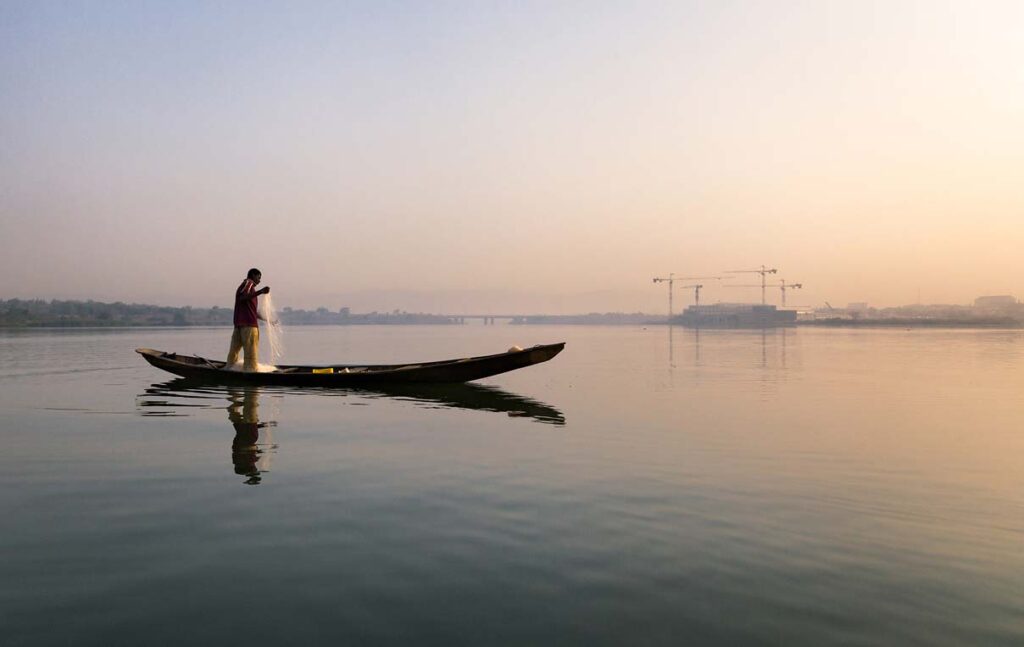
“The mangrove ecosystem has been depleting fast, affected by oil exploration and illegal bunkering. There must be stakeholder engagements; you cannot sit down in Abuja and talk about the blue economy,” Erikowa said.
Some experts argue that the growing focus on the blue economy could ironically harm the marine ecosystems and communities it sets out to protect. Nnimmo Bassey, a Nigerian conservationist, warned that while the ocean economy might benefit coastal areas, it risks sidelining local communities and affecting their livelihoods and rights.
“Having a ministry on the blue economy is a wrong move,” said Bassey, director of the Health of Mother Earth Foundation, an environmental think-tank. “It opens the marine sector to great risks.”
Nigeria has a history of ignoring local communities in resource-rich areas during environmental and livelihood discussions. After decades of oil exploration, companies like Shell, ExxonMobil, and Eni are selling onshore assets to local firms and moving offshore – without consulting affected communities. Last year, the government announced it would approve asset sales if companies cleaned up and compensated communities, but approvals given in October lacked these conditions.
Bassey said the government’s sustainable conservation must prioritise coastal communities to ensure they benefit from the blue economy. Incentives could include paying locals for ecosystem services and social protection mechanisms to promote conservation and strengthen regulations, he said. The incentives could be tied to specific actions, such as observing closed fishing seasons or indirectly supporting conservation by reducing community vulnerability and building resilience through diversified livelihoods.
Marine protected areas should also be expanded to include estuaries, rivers, creeks, and other critical marine spaces for long-term conservation, Bassey said.
Onyema agrees that any projects must be centred around local communities. “Involving communities is crucial because they understand the terrain and their livelihoods, whether it is farming or fishing, which they’ve practised for generations. Without their involvement, you risk disrupting and impairing their livelihoods,” he said.
In the absence of government intervention, groups like Erokaya’s Coastal and Marine Areas Development Initiative say they are acting by planting new mangroves and conducting community outreach programmes that provide periodic enlightenment and health services to locals.

